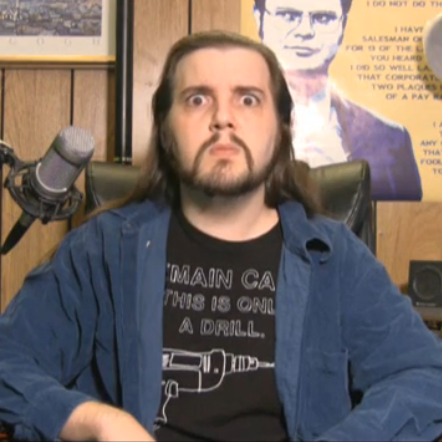Post by Armand Tanzarian on Sept 9, 2011 11:10:57 GMT -5
www.slate.com/id/2302831/ (Part 1)
For the 10th Anniversary of the attacks, Slate decied to focus on the conspiracy theory we know as "Trutherism" (there are obviously the essays on what 9/11 changed and what we done wrong, but this is the only topic I saw that warranted a 6-part special). Its a very long 6-piece that tracks the birth, growth, peak, decline and eventual flatlining of the movement in great detail, through interviews with current and former believers. And it always returns to the same themes that also, as the author illustrates at the end, apply to other conspiracies.
The interviewees and subjects include FSTDT familar Alex Jones and the creator of Loose Change. It details in the beginning the people who were the impetus of the theory, people like Alex Jones who already thrived on NWO conspiracies. People whom never believed the government could fuck up so bad to allow planes to crash into the World Trade Center, so it must be a deliberate act.
It also details how, in the early years, some conspiracies begin to take shape, and how Americans aren't the only people who have their own conspiracy theory. Take for instance the meme that 3,000 Jews didn't show up for work that day. That idea is still a relatively popular one in the Mideast.
The Bush Administration's lying and mishandling of Iraq gave the movement its deepest well and foremost vindication. If the government was lying about Iraq, they must be lying about the Attacks. This was the crest of the movement though, because it was around the middle of the decade that the 9/11 Commission report was released, and mainstream publications like Popular Mechanics started debunking Trutherism. Both lead to either outright rejection or evolution of the theory, both of which involved ever-crazier strawmen like 'nano-thermite', missiles disguised as airplanes, and voice-morphing technology to convince loved ones of victims on the plane that they were still alive, not, say that they were dead and actually an ICBM hit the towers.
The more implausible theories had an effect of disillusioning many members of the movement, as well as the fact that the movement eventually faced natural attrition. Those who renounced the movement were utterly shunned and accused as part of the very conspiracy they used to believe in. Little things become huge in a conspirator's eyes, every action is a conscious action of the other side. This is where the movement almost exclusively becomes the realm of the paranoid.
Bush leaves office. By this time the movement has shrunk to a fraction of the populace, by which it remains. They continue to be 'vindicated', they believe, through the killing of Bin Laden (they allege is a cover up) and other minor 'findings'. The author then argues how the movement will never die, because people will always have a healthy distrust of the government, the very point trutherism feeds on. He also ties this to the other raging conspiracy theory or our era; Birtherism. Birtherism had the disadvantage of having a swifter refutation when Obama showed his birth certificate, but even now its still alive. There is no reason Trutherism will die anytime soon either.
For the 10th Anniversary of the attacks, Slate decied to focus on the conspiracy theory we know as "Trutherism" (there are obviously the essays on what 9/11 changed and what we done wrong, but this is the only topic I saw that warranted a 6-part special). Its a very long 6-piece that tracks the birth, growth, peak, decline and eventual flatlining of the movement in great detail, through interviews with current and former believers. And it always returns to the same themes that also, as the author illustrates at the end, apply to other conspiracies.
Conspiracy theories thrive by appealing to existing hatred, paranoia, and uncertainty. The hatred can wither. The paranoia can crack. And the uncertainty can disappear. But the conspiracy theory lives or dies, prospers or fades, for reasons almost entirely unrelated to its actual content.
The interviewees and subjects include FSTDT familar Alex Jones and the creator of Loose Change. It details in the beginning the people who were the impetus of the theory, people like Alex Jones who already thrived on NWO conspiracies. People whom never believed the government could fuck up so bad to allow planes to crash into the World Trade Center, so it must be a deliberate act.
For Ruppert, it was inconceivable that the most expensive air defense system in the world could possibly have failed that day. Never mind that it was a system whose primary mission was to guard against Soviet encroachment for 40 years and which continued to focus exclusively on external threats in the decade following the end of the Cold War. It should have been ready, and if it wasn't, then it had to be because of internal sabotage.
It also details how, in the early years, some conspiracies begin to take shape, and how Americans aren't the only people who have their own conspiracy theory. Take for instance the meme that 3,000 Jews didn't show up for work that day. That idea is still a relatively popular one in the Mideast.
And there can be little doubt that by the middle of 2006, 9/11 conspiracy theorists had a new base to draw from. That base was general unhappiness with the war in Iraq and a small but deep strain of Bush hatred.
The Bush Administration's lying and mishandling of Iraq gave the movement its deepest well and foremost vindication. If the government was lying about Iraq, they must be lying about the Attacks. This was the crest of the movement though, because it was around the middle of the decade that the 9/11 Commission report was released, and mainstream publications like Popular Mechanics started debunking Trutherism. Both lead to either outright rejection or evolution of the theory, both of which involved ever-crazier strawmen like 'nano-thermite', missiles disguised as airplanes, and voice-morphing technology to convince loved ones of victims on the plane that they were still alive, not, say that they were dead and actually an ICBM hit the towers.
"This is a self-confirming hypothesis for the people who hold it," Meigs says. "In that sense it is immune from any kind of refutation and it is very similar to, if you've ever known a really hardcore, doctrinaire Marxist or a hardcore fundamentalist creationist. They have sort of a divine answer to every argument you might make."
Another common conspiracist tactic is to obsess over minor points of contention and exaggerate the importance of often easily explained inconsistencies in very hard evidence, such as phone calls victims made to family members on the ground describing the hijackings. For example, Griffin says that the phone calls, records of which were made public as part of the 9/11 Commission, were faked by "voice-morphing" technology that fooled family members on the ground.
The more implausible theories had an effect of disillusioning many members of the movement, as well as the fact that the movement eventually faced natural attrition. Those who renounced the movement were utterly shunned and accused as part of the very conspiracy they used to believe in. Little things become huge in a conspirator's eyes, every action is a conscious action of the other side. This is where the movement almost exclusively becomes the realm of the paranoid.
This relatively mild renunciation by a relatively minor advocate of 9/11 conspiracy theories (Vietch) was treated as major news in the conspiracy community. Veitch received threatening phone calls and emails. Donations to his site dried up. He was accused of having taken a payoff from the BBC, of having been subject to mind control by "neuro-linguistic programming experts," of being under hypnosis by British illusionist Derren Brown, and of being a Sunstein-sent cognitive infiltrator. "The best theory I heard has been that I have been deep undercover MI6 or CIA agent," Veitch said. "[They say] I was basically a one-man sleeper cell waiting to discredit the 9/11 Truth movement and destroy what they call 'the resistance' from within." Last month, Veitch's site was hacked and a message was sent to his 15,000 subscribers calling him a child abuser. "When your mom phones you saying, 'Why have you sent me something admitting to being a child molester?' it's not very good," Veitch said.
Bush leaves office. By this time the movement has shrunk to a fraction of the populace, by which it remains. They continue to be 'vindicated', they believe, through the killing of Bin Laden (they allege is a cover up) and other minor 'findings'. The author then argues how the movement will never die, because people will always have a healthy distrust of the government, the very point trutherism feeds on. He also ties this to the other raging conspiracy theory or our era; Birtherism. Birtherism had the disadvantage of having a swifter refutation when Obama showed his birth certificate, but even now its still alive. There is no reason Trutherism will die anytime soon either.










